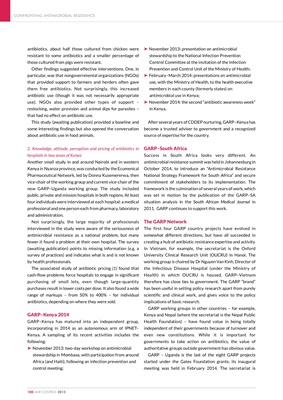
antibiotics, about half those cultured from chicken were
resistant to some antibiotics and a smaller percentage of
those cultured from pigs were resistant.
Other findings suggested effective interventions. One, in
particular, was that nongovernmental organizations (NGOs)
that provided support to farmers and herders often gave
them free antibiotics. Not surprisingly, this increased
antibiotic use (though it was not necessarily appropriate
use). NGOs also provided other types of support -
restocking, water provision and animal dips for parasites -
that had no effect on antibiotic use.
This study (awaiting publication) provided a baseline and
some interesting findings but also opened the conversation
about antibiotic use in food animals.
2. Knowledge, attitude, perception and pricing of antibiotics in
hospitals in two areas of Kenya
Another small study in and around Nairobi and in western
Kenya in Nyanza province, was conducted by the Ecumenical
Pharmaceutical Network, led by Donna Kusemererwa, then
vice-chair of the working group and current vice-chair of the
new GARP-Uganda working group. The study included
public, private and mission hospitals in both regions. At least
four individuals were interviewed at each hospital: a medical
professional and one person each from pharmacy, laboratory
and administration.
Not surprisingly, the large majority of professionals
interviewed in the study were aware of the seriousness of
antimicrobial resistance as a national problem, but many
fewer it found a problem at their own hospital. The survey
(awaiting publication) points to missing information (e.g. a
survey of practices) and indicates what is and is not known
by health professionals.
The associated study of antibiotic pricing (1) found that
cash-flow problems force hospitals to engage in significant
purchasing of small lots, even though large-quantity
purchases result in lower costs per dose. It also found a wide
range of markups - from 50% to 400% - for individual
antibiotics, depending on where they were sold.
GARP-Kenya 2014
GARP-Kenya has matured into an independent group,
incorporating in 2014 as an autonomous arm of IPNET-
Kenya. A sampling of its recent activities includes the
following:
‰ November 2013: two-day workshop on antimicrobial
stewardship in Mombasa, with participation from around
Africa (and Haiti), following an infection prevention and
control meeting;
‰ November 2013: presentation on antimicrobial
stewardship to the National Infection Prevention
Control Committee at the invitation of the Infection
Prevention and Control Unit of the Ministry of Health;
‰ February-March 2014: presentations on antimicrobial
use, with the Ministry of Health, to the health executive
members in each county (formerly states) on
antimicrobial use in Kenya;
‰ November 2014: the second "antibiotic awareness week"
in Kenya.
After several years of CDDEP nurturing, GARP-Kenya has
become a trusted adviser to government and a recognized
source of expertise for the country.
GARP-South Africa
Success in South Africa looks very different. An
antimicrobial resistance summit was held in Johannesburg in
October 2014, to introduce an "Antimicrobial Resistance
National Strategy Framework for South Africa" and secure
commitment of stakeholders to its implementation. The
framework is the culmination of several years of work, which
was set in motion by the publication of the GARP-SA
situation analysis in the South African Medical Journal in
2011. GARP continues to support this work.
The GARP Network
The first four GARP country projects have evolved in
somewhat different directions, but have all succeeded in
creating a hub of antibiotic resistance expertise and activity.
In Vietnam, for example, the secretariat is the Oxford
University Clinical Research Unit (OUCRU) in Hanoi. The
working group is chaired by Dr Nguyen Van Kinh, Director of
the Infectious Disease Hospital (under the Ministry of
Health) in which OUCRU is housed. GARP-Vietnam
therefore has close ties to government. The GARP "brand"
has been useful in setting policy research apart from purely
scientific and clinical work, and gives voice to the policy
implications of basic research.
GARP working groups in other countries - for example,
Kenya and Nepal (where the secretariat is the Nepal Public
Health Foundation) - have found value in being totally
independent of their governments because of turnover and
even new constitutions. While it is important for
governments to take action on antibiotics, the value of
authoritative groups outside government has obvious value.
GARP - Uganda is the last of the eight GARP projects
started under the Gates Foundation grants; its inaugural
meeting was held in February 2014. The secretariat is
CONFRONTING ANTIMICROBIAL RESISTANCE
100 AMR CONTROL 2015